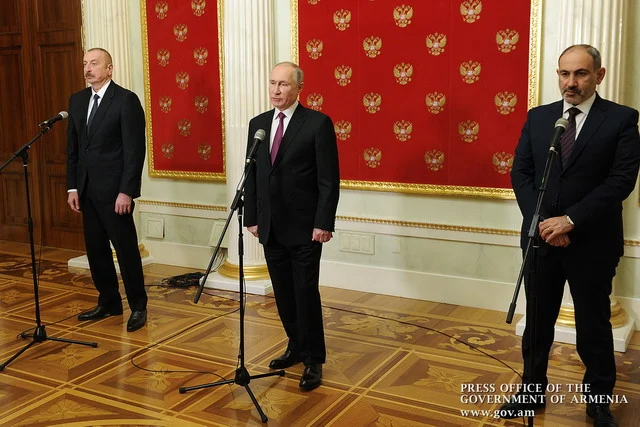Regardless of who represented Armenia in Moscow yesterday, we want to make sure that any leader of our country (even a failed and defeated leader, as is the case here) has the strongest playing cards during such negotiations. Therefore, let’s list Armenia’s and Azerbaijan’s agendas during this meeting.
We are more interested in the exchange of prisoners, soldiers missing in action, and finding the bodies of dead soldiers, stabilizing the situation at the border in Syunik, as well as unblocking routes to Iran and Russia via Azerbaijan in the future.
Azerbaijan needs the dissolution of the Artsakh Defense Army and the government in general, the cessation of Artsakh as a factor, and the appointment of a Russian governor-general in the remaining 30 percent of the territory, whose candidacy has been agreed with the Azerbaijani side. Azerbaijan wants Russian peacekeepers to not hinder the operations of its army, particularly in the Shushi region. And the most important thing is the desire of Azerbaijan and Turkey to open a corridor between Nakhichevan and the rest of Azerbaijan through Meghri.
I suggest that readers judge for themselves which side’s plans are more likely to be implemented. I believe that any person who is able to judge objectively will agree that our playing cards are weak after our military defeat.
Read also
That reality was more or less clear before January 11th, and even more so now. It’s not clear how we can play with these weak cards, how we can ensure that Azerbaijan’s (and Turkey’s) plans are not implemented, and how we can resolve our problems in the most optimal manner.
Nikol Pashinyan does not know that, and he is not appropriately prepared for that even if we set aside the fact that such issues don’t really interest him. Excessive Facebook likes and his endearing words towards his voters or opponents are more important to him than fighting against threats to the state. We can expect yet another “spirited” message from the Prime Minister full of excuses, as well as forceful steps within the country that will enable him to remain in power.
But that is not the worst of it. It is an even bigger tragedy that his opponents also do not know how to prevent threats against the state. The Prime Minister did not sign any treacherous documents yesterday in Moscow, but that did not make our situation any easier. When members of the opposition dispute the trilateral statement signed on November 9th and calls for the non-fulfillment of its provisions, they are not really considering the consequences of such a proposal. When the authorities, those in favor of Nikol, and those against Nikol claim that “good negotiations can bring back Shushi and Hadrut,” they are either detached from reality or misleading the public.
Yes, Pashinyan is beneficial to Putin at the moment since he generally enables Russian plans to be implemented, and he is also beneficial to Aliyev since it is easy for him to work with the defeated leader of his opposing nation. However, let’s imagine for a moment that another leader of Armenia went to Moscow on January 11th instead of Pashinyan. What were they supposed to do?
Aram Abrahamyan


















































